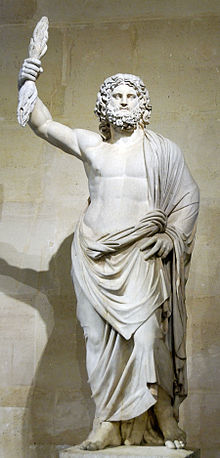Also on this page:
Greek God Names,
Greek Mythology Gods,
Ancient Greek Gods,
Greek Gods Names,
The Greek Gods,
More Mythology Topics
More Topic Categories
Greek Gods
 In Ancient Greek mythology, there were numerous gods and goddesses, minor and major, living in woods, rivers, mountain peaks, etc. Probably the best – known of them all are the Olympians, also known as the Dodekatheon (Dodeka > twelve, theon > gods).
In Ancient Greek mythology, there were numerous gods and goddesses, minor and major, living in woods, rivers, mountain peaks, etc. Probably the best – known of them all are the Olympians, also known as the Dodekatheon (Dodeka > twelve, theon > gods).The names of the male gods belonging to the Dodekatheon are Zeus, Poseidon, Apollo, Ares, Hephaestus and Hermes. Sometimes, Hades was also included, although this was rare as he was considered to leave in the Underworld and not in Mount Olympus. Moreover, Dionysus, Heracles and Asclepius were sometimes included in the Olympian Gods. Zeus was the King of Gods, the sky and thunder. He was the youngest child of the Titans Cronus and Rhea, brother of Poseidon and Hades. Poseidon was the God of the seas, earthquakes and tidal waves. He was married to Amphitrite, a Nereid, but like his brother, he had many lovers. Apollo was the God of Light, knowledge, music and the arts, among others. He was the son of Zeus and Leto, twin brother of Artemis. Ares was the God of was and violence, son of Zeus and Hera, hated by the other gods, except Aphrodite. Hephaestus was the blacksmith of the gods, God of fire and the forge. He was son of Hera, either by Zeus or alone. He was married to Aphrodite. Finally, Hermes was the messenger of the gods, as well as God of commerce, thieves and games. He was the son of Zeus and the nymph Maia.
Before the Olympians settled in Mount Olympus, other Gods reigned over the region of Greece. The primordial Greek gods were the earliest beings in existence, the origins of the later generations of Greek Gods, and were created by Chaos. According to Hesiod’s Theogony, the male primordial Greek gods are Erebus, Aether, Uranus, the Ourea, Pontus, Tartarus, and Eros; Chronos, Hydros and Ophion were other male deities, but were not born by Chaos. Erebus represented darkness, while Aether was light. Uranus, the Ourea and Pontus represented Heaven, the Mountains and the Seas respectively, while Tartarus was the Hellpit and Eros was Procreation. Finally, Chronos was the deity of Time, Hydros represented the Primordial Waters, while Ophion was the Serpent, often identified with other deities, such as Uranus or Chronos.
The Primordial Gods were replaced by the Titans, children of Uranus (god of the Sky) and Gaia (goddess of the Earth) that ruled during the first Age of Men, the Golden Age. The male Titans were Oceanus, Hyperion, Coeus, Cronus, Crius and Iapetus. Oceanus represented the World Ocean, an enormous river encircling the world, while Hyperion was the father of Helios. Coeus was the embodiment of the celestial axis around which the heavens revolve, while Cronus was the leader of the Titans, who overthrew his father and was later overthrown by his son, Zeus. Crius was the least individualized among the Titans, and Iapetus may have been regarded as God of craftsmanship or mortality.
See Also:
 Athens Photos
Athens Photos
 Santorini Photos
Santorini Photos
 Crete Photos
Crete Photos
 Meteora Photos
Meteora Photos
 Corfu Photos
Corfu Photos

